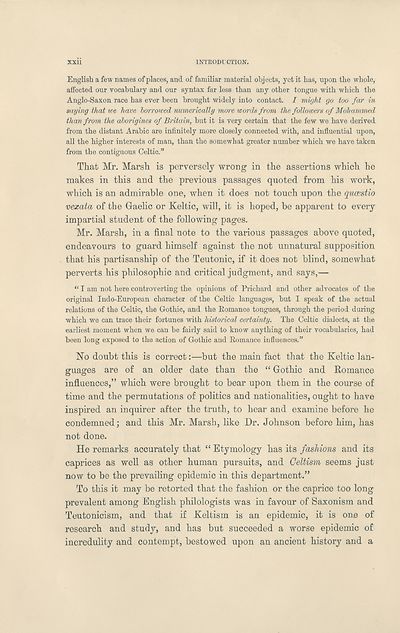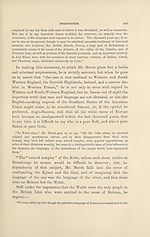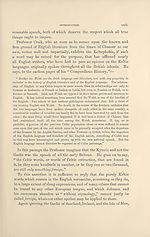Books and other items printed in Gaelic from 1871 to 1900 > Gaelic etymology of the languages of Western Europe, and more especially of the English and Lowland Scotch
(26) Page xxii
Download files
Complete book:
Individual page:
Thumbnail gallery: Grid view | List view

xxu
INTRODUCTION.
English a few names of places, and of familiar material objects, yet it has, upon the whole,
affected our vocabulary and our syntax far less than any other tongue with which the
Anglo-Saxon race has ever been brought widely into contact. I might go too far in
saying that ice have borrowed numerically more words from the followers of Mohammed
than from the aborigines of Britain, but it is very certain that the few we have derived
from the distant Arabic are infinitely more closely connected with, and influential upon,
all the higher interests of man, than the somewhat greater number which we have taken
from the contiguous Celtic.”
That Mr. Marsh is perversely wrong in the assertions which he
makes in this and the previous passages quoted from his work,
which is an admirable one, when it does not touch upon the queestio
vexata of the Gaelic or Keltic, will, it is hoped, be apparent to every
impartial student of the following pages.
Mr. Marsh, in a final note to the various passages above quoted,
endeavours to guard himself against the not unnatural supposition
that his partisanship of the Teutonic, if it does not blind, somewhat
perverts his philosophic and critical judgment, and says,—
“ I am not here controverting the opinions of Prichard and other advocates of the
original Indo-European character of the Celtic languages, but I speak of the actual
relations of the Celtic, the Gothic, and the Romance tongues, through the period during
which we can trace their fortunes with historical certainty. The Celtic dialects, at the
earliest moment when we can be fairly said to know anything of their vocabularies, had
been long exposed to the action of Gothic and Romance influences.”
No doubt tills is correct:—but the main fact that the Keltic lan¬
guages are of an older date than the “ Gothic and Romance
influences,” which were brought to bear upon them in the course of
time and the permutations of politics and nationalities, ought to have
inspired an inquirer after the truth, to hear and examine before he
condemned; and this Mr. Marsh, like Dr. Johnson before him, has
not done.
He remarks accurately that “ Etymology has its fashions and its
caprices as well as other human pursuits, and Celtism seems just
now to be the prevailing epidemic in this department.”
To this it may be retorted that the fashion or the caprice too long
prevalent among English philologists was in favour of Saxonism and
Teutonicism, and that if Keltism is an epidemic, it is one of
research and study, and has but succeeded a worse epidemic of
incredulity and contempt, bestowed upon an ancient history and a
INTRODUCTION.
English a few names of places, and of familiar material objects, yet it has, upon the whole,
affected our vocabulary and our syntax far less than any other tongue with which the
Anglo-Saxon race has ever been brought widely into contact. I might go too far in
saying that ice have borrowed numerically more words from the followers of Mohammed
than from the aborigines of Britain, but it is very certain that the few we have derived
from the distant Arabic are infinitely more closely connected with, and influential upon,
all the higher interests of man, than the somewhat greater number which we have taken
from the contiguous Celtic.”
That Mr. Marsh is perversely wrong in the assertions which he
makes in this and the previous passages quoted from his work,
which is an admirable one, when it does not touch upon the queestio
vexata of the Gaelic or Keltic, will, it is hoped, be apparent to every
impartial student of the following pages.
Mr. Marsh, in a final note to the various passages above quoted,
endeavours to guard himself against the not unnatural supposition
that his partisanship of the Teutonic, if it does not blind, somewhat
perverts his philosophic and critical judgment, and says,—
“ I am not here controverting the opinions of Prichard and other advocates of the
original Indo-European character of the Celtic languages, but I speak of the actual
relations of the Celtic, the Gothic, and the Romance tongues, through the period during
which we can trace their fortunes with historical certainty. The Celtic dialects, at the
earliest moment when we can be fairly said to know anything of their vocabularies, had
been long exposed to the action of Gothic and Romance influences.”
No doubt tills is correct:—but the main fact that the Keltic lan¬
guages are of an older date than the “ Gothic and Romance
influences,” which were brought to bear upon them in the course of
time and the permutations of politics and nationalities, ought to have
inspired an inquirer after the truth, to hear and examine before he
condemned; and this Mr. Marsh, like Dr. Johnson before him, has
not done.
He remarks accurately that “ Etymology has its fashions and its
caprices as well as other human pursuits, and Celtism seems just
now to be the prevailing epidemic in this department.”
To this it may be retorted that the fashion or the caprice too long
prevalent among English philologists was in favour of Saxonism and
Teutonicism, and that if Keltism is an epidemic, it is one of
research and study, and has but succeeded a worse epidemic of
incredulity and contempt, bestowed upon an ancient history and a
Set display mode to:
![]() Universal Viewer |
Universal Viewer | ![]() Mirador |
Large image | Transcription
Mirador |
Large image | Transcription
Images and transcriptions on this page, including medium image downloads, may be used under the Creative Commons Attribution 4.0 International Licence unless otherwise stated. ![]()
| Permanent URL | https://digital.nls.uk/106562085 |
|---|
| Description | Out-of-copyright books printed in Gaelic between 1631 and 1900. Also some pamphlets and chapbooks. Includes poetry and songs, religious books such as catechisms and hymns, and different editions of the Bible and the Psalms. Also includes the second book ever published in Gaelic in 1631. |
|---|

